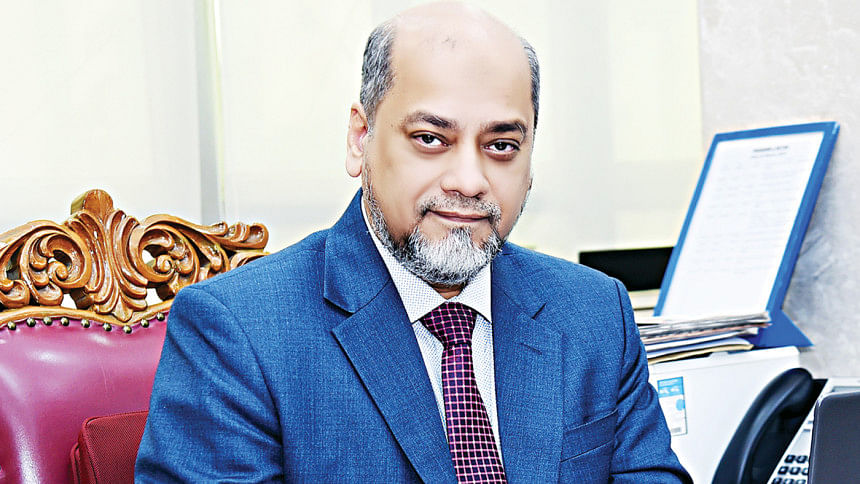Opening global trade opportunities for MSME entrepreneurs

Mohammad Ali
Managing Director & CEO, Pubali Bank
The Daily Star (TDS): How do you assess the current state of the MSME sector in Bangladesh, and what role do you think banks can play in accelerating its growth?
Mohammad Ali (MA): When considering a country's economic development—whether from a financial sector or macroeconomic perspective—the SME sector must be at the core of our focus. Development is not merely about income generation; if we truly aim to reduce inequality, prioritising SMEs is essential, as they sit at the heart of the economic structure.
Bankers play a crucial role in supporting entrepreneurs through each stage of growth—from individual to cottage, then micro, small, medium, and ultimately into full-fledged enterprises. In doing so, they actively contribute to job creation and overall wealth generation. Our banking sector already has significant experience in SME financing.
When examining classified loans in Bangladesh, the real challenge lies in large corporate loans, where most defaults and irregularities are concentrated. These loans are often linked to fraudulent practices, political pressure, and undue influence. By contrast, the SME sector is largely free from such issues. A banking industry that focuses on SMEs is less vulnerable to pressure groups and maintains a healthier loan portfolio.
TDS: What are the major challenges MSMEs face in accessing finance, and how is your bank addressing these issues?
MA: In the case of governance, there is often a lack of sufficient knowledge in this area. MSMEs mostly learn through hands-on experience. But when it comes to corporate governance, maintaining proper accounting practices, or scaling up the business, they face additional challenges—like the need for security or collateral, which becomes difficult for them.
Since their financial resilience is generally low, if a natural disaster occurs—like a flood or a storm—or even if the entrepreneur falls seriously ill, they can quickly fall into financial crisis.
In the case of SMEs, our first approach is to offer the most competitive pricing—usually aiming to stay at the lowest in the market. If someone from a remote area wishes to engage in export, our nationwide branch network is fully equipped to support them. Whether it involves import or export, we are now able to provide the required assistance—and we treat this as a top priority.
Additionally, to educate them—specifically in financial literacy—we are regularly organising various seminars. We are working on creating awareness programmes to teach them how to properly conduct Due Diligence (DDC), how to carry out audits, how to maintain accurate cash flow statements, and how to manage proper accounting records. The aim is to help them develop these practices correctly within their own accounts and day-to-day financial management.
TDS: Does your bank have any dedicated products, financial literacy programmes, or credit guarantee schemes targeted at MSMEs?
MA: At Pubali Bank, everyone is now working with the clustering method, focusing on cluster-based initiatives. Through this approach, financing can be provided collectively for the entire cluster, and they themselves can work together to make it happen. We are also trying to ensure that financing decisions can be made in the shortest possible time by reviewing their cash flow statements. Additionally, we are not imposing unnecessary charges. We are working to introduce and expand various such facilities to better support the SMEs.
TDS: How has your bank leveraged technology or digital banking solutions to improve outreach and services to MSMEs, particularly in semi-urban and rural areas?
MA: In digital banking, we have our PI Banking platform. It is available for both our corporate clients and SMEs. In most SME cases, we see that often a single person approves transactions, although in some cases, there may be two people involved—one initiates the transaction and the other approves it. Since these are financial transactions, we have incorporated all these features into our mobile app, enabling SMEs to carry out their operations seamlessly. This means that from their office, they can perform all their banking activities such as batch transactions, BFTN, RTGS, NPSB—all types of transactions. They can also view their account statements directly through the app.
TDS: What steps is your institution taking to support women-led MSMEs and promote financial inclusion among underrepresented segments?
MA: Women are truly one of our greatest driving forces—making up 51 percent, which is very significant. The important thing is that women generally manage money very efficiently. Most of our small microcredit initiatives are already centred around women, and it's a positive sign that women want to become entrepreneurs. At Pubali Bank, we are giving the highest priority to women in the SME sector. Supporting women entrepreneurs is one of our key focus areas.
TDS: Looking ahead, what policy reforms or collaborative efforts between banks and the government would you recommend to ensure sustainable development of Bangladesh's MSME ecosystem?
MA: The most important thing is to provide support—this can be sectoral support, related support, or even targeted support specifically for women. Right now, inflation is very high. Previously, there were special funds of Tk 10,000 crore to Tk 20,000 crore for them. The first priority should be lowering the cost of financing, which banks alone cannot do. If inflation decreases, I would suggest that the Bangladesh Bank or the government take initiatives to create special funds for this purpose.

 For all latest news, follow The Daily Star's Google News channel.
For all latest news, follow The Daily Star's Google News channel. 



Comments